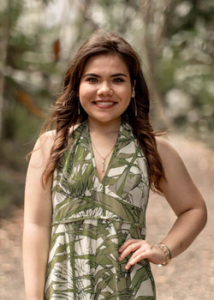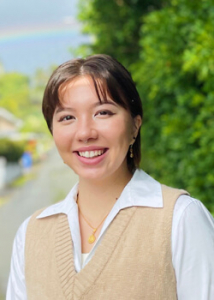
Pursuing Health Equity Through a New Lens With WGSS
By UH News
Medicine, nursing and public health are popular majors students who desire a career in health care choose at the University of Hawaiʻi at Mānoa. They can also add a double major to better understand and help dispel prejudices experienced by women, LGBTQ+ and marginalized groups in society.
In the College of Social Sciences, the Department of Women, Gender and Sexuality Studies (WGSS), formerly known as Women’s Studies, offers an interdisciplinary approach to studying women and gender issues, featuring a BA major with a fully online option, undergraduate and queer studiescertificates, and a graduate certificate.
“We all deserve full health potential, but disparities exist among specific population groups in the attainment of that,” said Lani Teves, WGSS chair and associate professor. “This is why students have many opportunities across our curriculum to think critically and creatively about solutions to health inequities, and to see themselves as key actors in making health care more accessible and equitable across many communities.”
A WGSS student and two alumni explain why seeking a double major in WGSS made sense to them in pursuit of health care careers.
‘Topics touch so many strands of my identity’

Cassidy Silva came to UH Mānoa in 2019 as a Regents Scholar. With the intent of applying to medical school after earning her bachelor’s degree in cell biology, the Mililani High School graduate plunged headlong into WGSS and found the subject matter fascinating.
“There’s a synergy that exists between all that I learn in the classroom, my past experiences, and my personal and professional goals,” said Silva. “Like that of no other field of study, WGSS topics touch so many strands of my identity.”
As a research intern at Kapiʻolani Medical Center for Women and Children, Silva helped recruit participants for a study on the diet and eating practices of Native Hawaiian mothers and their babies. Silva also ran the social media account of the Hawaiʻi-based organization SafeSex808, which focuses on expanding teen knowledge of safe and consensual sex.
She used her WGSS education while interning at the John A. Burns School of Medicine’s (JABSOM) Department of Obstetrics, Gynecology and Women’s Health, which fits into her dream of becoming a doctor specializing in reproductive endocrinology and infertility. Silva is currently a junior hoping to graduate in spring 2023.
‘Working to create a more equitable society’

Cameron Woods, who graduated in spring 2022 with their bachelor’s in public health and WGSS, hopes to be a nurse practitioner. A Kalani High School graduate, Woods enrolled at UHMānoa in 2018 and was eager to take all the public health classes that were offered. Yet, as a sophomore, Woods felt something was missing.
“It became clear that my public health education would not be complete without studying and understanding the historical, social and structural issues that have created and perpetuated health disparities,” said the 2018 Regents Scholar.
That’s when WGSS became Woods’ second major. Woods also found fulfilling part-time work at a local health center, where two aspects of the job were making organizational changes to ensure LGBTQ+ patients and employees feel safe and comfortable in the clinic, and meeting with patients seeking guidance on gender-affirming health care.
“Our insurance system makes it very difficult for people to receive gender-affirming care, and it can be quite challenging and even traumatizing to navigate the health system on their own. I tried to take as much of that burden off the patient,” they said. “My advice to students, if you want to challenge yourself to deconstruct and reframe your ideas about society, and have a career working to create a more equitable society, WGSS is a great major to consider.”
‘I am a better person today because of WGSS’

Austin Ajimura, who graduated in 2019 with his bachelor’s in biology and WGSS, is pursuing a master’s in public health in social and behavioral health sciences, with the hopes of becoming a public health professional.
From early childhood to serving as Mililani High’s student body president, Ajimura wanted to pursue a career in medicine. “But what I failed to consider were the forces that affect my patients’ lives external to medicine”, said Ajimura. “When someone leaves the clinic, no matter how much you try to help them, they will continue to face their challenges.”
Ajimura is still haunted by the memory of a client while volunteering at JABSOM’s HOME (Houseless Outreach and Medical Education) Project.
“The client was in the final stages of cancer, a chronically houseless veteran and not receiving needed medical care or social support. We were able to assist to the best of our abilities but I never saw this individual again. I think about that person a lot. The experience further fueled my passion for change, because it was the first time I really saw the direct and devastating impacts of health disparities and poor access to health care.”
Ajimura’s main duties at Hawaiʻi HOME are assisting patients to obtain health insurance, establish primary care, and identify/overcome insurance and treatment barriers. He also works with city first-responders who have contracted or been exposed to COVID-19 by doing data collection and case investigation, determining appropriate quarantine/isolation timelines, and providing follow-up.
“I am a better person today because of WGSS. It has transformed me in the way that I view the world and society,” he said.
Image – University of Hawaii at Manoa






